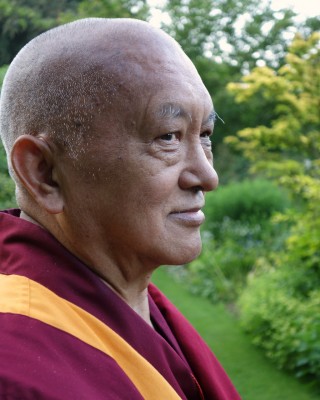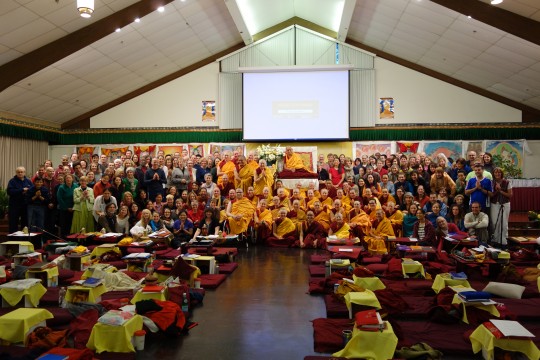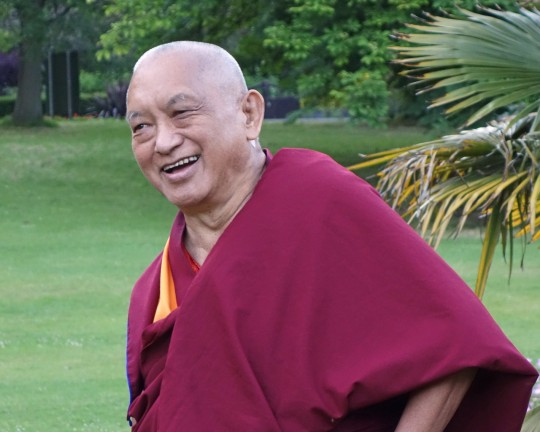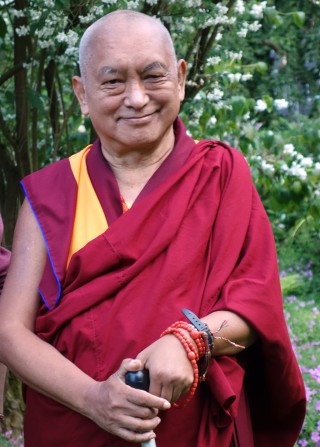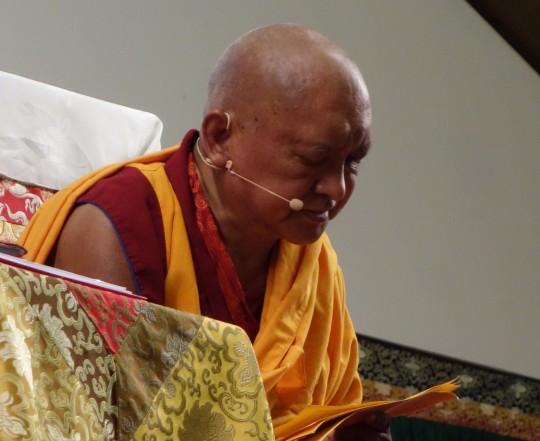- Home
- FPMT Homepage
Foundation for the Preservation of the Mahayana Tradition
The FPMT is an organization devoted to preserving and spreading Mahayana Buddhism worldwide by creating opportunities to listen, reflect, meditate, practice and actualize the unmistaken teachings of the Buddha and based on that experience spreading the Dharma to sentient beings. We provide integrated education through which people’s minds and hearts can be transformed into their highest potential for the benefit of others, inspired by an attitude of universal responsibility and service. We are committed to creating harmonious environments and helping all beings develop their full potential of infinite wisdom and compassion. Our organization is based on the Buddhist tradition of Lama Tsongkhapa of Tibet as taught to us by our founders Lama Thubten Yeshe and Lama Thubten Zopa Rinpoche.
- Willkommen
Die Stiftung zur Erhaltung der Mahayana Tradition (FPMT) ist eine Organisation, die sich weltweit für die Erhaltung und Verbreitung des Mahayana-Buddhismus einsetzt, indem sie Möglichkeiten schafft, den makellosen Lehren des Buddha zuzuhören, über sie zur reflektieren und zu meditieren und auf der Grundlage dieser Erfahrung das Dharma unter den Lebewesen zu verbreiten.
Wir bieten integrierte Schulungswege an, durch denen der Geist und das Herz der Menschen in ihr höchstes Potential verwandelt werden zum Wohl der anderen – inspiriert durch eine Haltung der universellen Verantwortung und dem Wunsch zu dienen. Wir haben uns verpflichtet, harmonische Umgebungen zu schaffen und allen Wesen zu helfen, ihr volles Potenzial unendlicher Weisheit und grenzenlosen Mitgefühls zu verwirklichen.
Unsere Organisation basiert auf der buddhistischen Tradition von Lama Tsongkhapa von Tibet, so wie sie uns von unseren Gründern Lama Thubten Yeshe und Lama Thubten Zopa Rinpoche gelehrt wird.
- Bienvenidos
La Fundación para la preservación de la tradición Mahayana (FPMT) es una organización que se dedica a preservar y difundir el budismo Mahayana en todo el mundo, creando oportunidades para escuchar, reflexionar, meditar, practicar y actualizar las enseñanzas inconfundibles de Buda y en base a esa experiencia difundir el Dharma a los seres.
Proporcionamos una educación integrada a través de la cual las mentes y los corazones de las personas se pueden transformar en su mayor potencial para el beneficio de los demás, inspirados por una actitud de responsabilidad y servicio universales. Estamos comprometidos a crear ambientes armoniosos y ayudar a todos los seres a desarrollar todo su potencial de infinita sabiduría y compasión.
Nuestra organización se basa en la tradición budista de Lama Tsongkhapa del Tíbet como nos lo enseñaron nuestros fundadores Lama Thubten Yeshe y Lama Zopa Rinpoche.
A continuación puede ver una lista de los centros y sus páginas web en su lengua preferida.
- Bienvenue
L’organisation de la FPMT a pour vocation la préservation et la diffusion du bouddhisme du mahayana dans le monde entier. Elle offre l’opportunité d’écouter, de réfléchir, de méditer, de pratiquer et de réaliser les enseignements excellents du Bouddha, pour ensuite transmettre le Dharma à tous les êtres. Nous proposons une formation intégrée grâce à laquelle le cœur et l’esprit de chacun peuvent accomplir leur potentiel le plus élevé pour le bien d’autrui, inspirés par le sens du service et une responsabilité universelle. Nous nous engageons à créer un environnement harmonieux et à aider tous les êtres à épanouir leur potentiel illimité de compassion et de sagesse. Notre organisation s’appuie sur la tradition guéloukpa de Lama Tsongkhapa du Tibet, telle qu’elle a été enseignée par nos fondateurs Lama Thoubtèn Yéshé et Lama Zopa Rinpoché.
Visitez le site de notre Editions Mahayana pour les traductions, conseils et nouvelles du Bureau international en français.
Voici une liste de centres et de leurs sites dans votre langue préférée
- Benvenuto
L’FPMT è un organizzazione il cui scopo è preservare e diffondere il Buddhismo Mahayana nel mondo, creando occasioni di ascolto, riflessione, meditazione e pratica dei perfetti insegnamenti del Buddha, al fine di attualizzare e diffondere il Dharma fra tutti gli esseri senzienti.
Offriamo un’educazione integrata, che può trasformare la mente e i cuori delle persone nel loro massimo potenziale, per il beneficio di tutti gli esseri, ispirati da un’attitudine di responsabilità universale e di servizio.
Il nostro obiettivo è quello di creare contesti armoniosi e aiutare tutti gli esseri a sviluppare in modo completo le proprie potenzialità di infinita saggezza e compassione.
La nostra organizzazione si basa sulla tradizione buddhista di Lama Tsongkhapa del Tibet, così come ci è stata insegnata dai nostri fondatori Lama Thubten Yeshe e Lama Zopa Rinpoche.
Di seguito potete trovare un elenco dei centri e dei loro siti nella lingua da voi prescelta.
- 欢迎 / 歡迎
简体中文
“护持大乘法脉基金会”( 英文简称:FPMT。全名:Foundation for the Preservation of the Mahayana Tradition) 是一个致力于护持和弘扬大乘佛法的国际佛教组织。我们提供听闻,思维,禅修,修行和实证佛陀无误教法的机会,以便让一切众生都能够享受佛法的指引和滋润。
我们全力创造和谐融洽的环境, 为人们提供解行并重的完整佛法教育,以便启发内在的环宇悲心及责任心,并开发内心所蕴藏的巨大潜能 — 无限的智慧与悲心 — 以便利益和服务一切有情。
FPMT的创办人是图腾耶喜喇嘛和喇嘛梭巴仁波切。我们所修习的是由两位上师所教导的,西藏喀巴大师的佛法传承。
繁體中文
護持大乘法脈基金會”( 英文簡稱:FPMT。全名:Found
ation for the Preservation of the Mahayana Tradition ) 是一個致力於護持和弘揚大乘佛法的國際佛教組織。我們提供聽聞, 思維,禪修,修行和實證佛陀無誤教法的機會,以便讓一切眾生都能 夠享受佛法的指引和滋潤。 我們全力創造和諧融洽的環境,
為人們提供解行並重的完整佛法教育,以便啟發內在的環宇悲心及責 任心,並開發內心所蘊藏的巨大潛能 — 無限的智慧與悲心 – – 以便利益和服務一切有情。 FPMT的創辦人是圖騰耶喜喇嘛和喇嘛梭巴仁波切。
我們所修習的是由兩位上師所教導的,西藏喀巴大師的佛法傳承。 察看道场信息:
- FPMT Homepage
- News/Media
-
- Study & Practice
-
-
- About FPMT Education Services
- Latest News
- Programs
- New to Buddhism?
- Buddhist Mind Science: Activating Your Potential
- Heart Advice for Death and Dying
- Discovering Buddhism
- Living in the Path
- Exploring Buddhism
- FPMT Basic Program
- FPMT Masters Program
- FPMT In-Depth Meditation Training
- Maitripa College
- Lotsawa Rinchen Zangpo Translator Program
- Universal Education for Compassion & Wisdom
- Online Learning Center
-
- Prayers & Practice Materials
- Overview of Prayers & Practices
- Full Catalogue of Prayers & Practice Materials
- Explore Popular Topics
- Benefiting Animals
- Chenrezig Resources
- Death & Dying Resources
- Lama Chopa (Guru Puja)
- Lama Zopa Rinpoche: Compendium of Precious Instructions
- Lama Zopa Rinpoche: Life Practice Advice
- Lama Zopa Rinpoche Practice Series
- Lamrim Resources
- Mantras
- Prayer Book Updates
- Purification Practices
- Sutras
- Thought Transformation (Lojong)
- Audio Materials
- Dharma Dates - Tibetan Calendar
- Translation Services
- Publishing Services
- Ways to Offer Support
- Prayers & Practice Materials
-
- Teachings and Advice
- Find Teachings and Advice
- Lama Zopa Rinpoche Advice Page
- Lama Zopa Rinpoche: Compendium of Precious Instructions
- Lama Zopa Rinpoche Video Teachings
- ༧སྐྱབས་རྗེ་བཟོད་པ་རིན་པོ་ཆེ་མཆོག་ནས་སྩལ་བའི་བཀའ་སློབ་བརྙན་འཕྲིན།
- Podcasts
- Lama Yeshe Wisdom Archive
- Buddhism FAQ
- Dharma for Young People
- Resources on Holy Objects
- Teachings and Advice
-
-
*If a menu item has a submenu clicking once will expand the menu clicking twice will open the page.
-
-
- Centers
-
- Teachers
-
- Projects
-
-
-
-
*If a menu item has a submenu clicking once will expand the menu clicking twice will open the page.
-
-
- FPMT
-
-
-
-
-
No matter whether you are a believer or a non-believer, religious or not religious, a Christian, Hindu, or a scientist, black or white, an Easterner or a Westerner, the most important thing to know is your own mind and how it works.
Lama Thubten Yeshe
-
-
-
- Shop
-
-
-
The Foundation Store is FPMT’s online shop and features a vast selection of Buddhist study and practice materials written or recommended by our lineage gurus. These items include homestudy programs, prayers and practices in PDF or eBook format, materials for children, and other resources to support practitioners.
Items displayed in the shop are made available for Dharma practice and educational purposes, and never for the purpose of profiting from their sale. Please read FPMT Foundation Store Policy Regarding Dharma Items for more information.
-
-
Study & Practice News
10
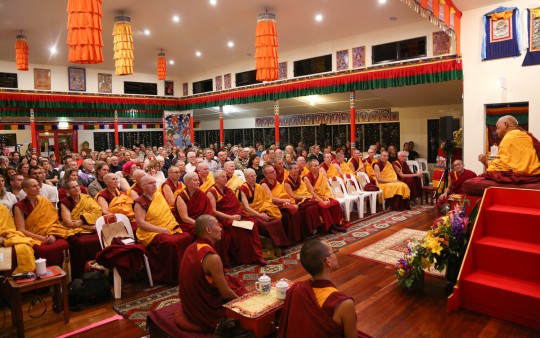
Lama Zopa Rinpoche giving teachings to Sangha and lay students at Chenrezig Institute, Eudlo, Australia, September 2014. Photo by Ven. Roger Kunsang.
Lama Zopa Rinpoche has given much advice to Sangha, which you can find in Lama Zopa Rinpoche’s Online Advice Book. Here’s an excerpt of Rinpoche’s advice on living as a monk, given several years ago in Bodhgaya:
“Morality is the road to liberation from samsara. With morality, it’s easy. Without morality, life creates obstacles for realizations, and then it creates sufferings. It destroys realizations and causes rebirths in lower realms.
“People are looking for happiness, but the method is important. Hunting and killing animals is creating suffering. Other people commit suicide; they kill themselves while they are looking for happiness. The aim for everyone is reaching happiness.
“Maybe it’s not possible to do it every day, but at least once a week or every two or four days we should go over the sutra looking at the benefits of the vows. This is fuel and gives us energy. It is very important. It makes the mind strong, directs the mind to be strong, and strengthens the mind of renunciation. …”
Learn more about Lama Zopa Rinpoche, spiritual director of the Foundation for the Preservation of Mahayana Tradition (FPMT), and Rinpoche’s vision for a better world. Sign up to receive news and updates.
27
*12/17/2015 Update: Please note that this practice has now been revised and is entitled, The Method to Transform a Suffering Life into Happiness (Including Enlightenment).
An essential practice for all students, Daily Meditation by Lama Zopa Rinpoche has been updated, with advice from Rinpoche, several times and is now in its most final form. You can download this practice from the FPMT Foundation Store.
Every day we have the opportunity to set our aspirations clearly before we engage with the world. As Lama Zopa Rinpoche advises, “In everyday life after the eyes open [on waking] set a Dharma intention and especially bodhichitta [motivation] by thinking, ‘Until I achieve enlightenment and until I die, especially today, may the activities of my body, speech and mind—listening, reflecting, meditation practice, walking, sleeping, eating, sitting, working and so forth not become the cause of suffering and become the cause of happiness, especially the cause of full enlightenment, i.e. the method to bring happiness to sentient beings.’”
Through comprehensive study programs, practice materials, training seminars, and scholarships, FPMT Education nourishes the development of compassion, wisdom, kindness, and true happiness in individuals of all ages.
- Tagged: daily meditation
27
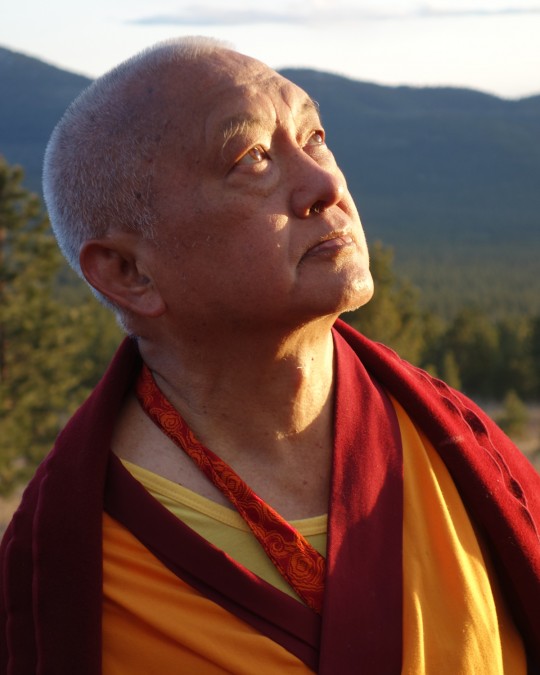
Lama Zopa Rinpoche at Buddha Amitabha Pure Land, Washington, US, April 2014. Photo Ven. Roger Kunsang.
“When you have in mind the thought that death can come today, if something suddenly happens, it is not a shock,” Lama Zopa Rinpoche instructs in his book Bodhisattva Attitude: How to Dedicate Your Life to Others. “It is not a shock at all because your mind is prepared. You have already trained your mind by thinking very strongly about death first thing every morning and keeping that awareness throughout the day. That helps you to be at peace and not have fear when you face a life-threatening problem or something similar.
“If your mind has not become Dharma because you haven’t trained in the thought of impermanence but instead have always thought, ‘I am going to live for a long time,’ and done all your activities with attachment to this life, then if something opposite to that suddenly happens and the reality of life – its impermanence – is shown, all of a sudden, while you are planning billions of things, you get an incredible shock.
“You may know Buddhism and have memorized the hundred volumes of the Buddha’s teachings (Kangyur) and the two hundred volumes of commentaries (Tengyur) and be able to explain and recite them by heart, but your mind has not thought about impermanence. You may know by heart all the root texts, the five great treatises, along with the tantric texts and commentaries and be able to explain them, but your mind has not thought of impermanence. Because you have been living your life with the concept of permanence, the day something happens and the reality of life is shown, it is a shock and there is incredible fear. Suddenly you see that you don’t want to die. It is not that you don’t want to die because you want to benefit sentient beings. I am not talking about that. You don’t want to die for fear of what will happen after death. You don’t want to die because of fear. You don’t want to lose this body. You don’t want to lose your possessions, property, belongings or family. Your mind is clinging to these things and because of that, there is great fear.
“Meditating on impermanence is the very beginning of Dharma, but look what happens if this meditation is left out or if you thought it wasn’t important because emptiness, shunyata or some tantric meditation was more important.”
You can read more from the chapter “The Teachings: Cutting the Concept of Permanence” from the book Bodhisattva Attitude: How to Dedicate Your Life to Others by Lama Zopa Rinpoche and published by the Lama Yeshe Wisdom Archive.
Learn more about FPMT spiritual director Lama Zopa Rinpoche and his beneficial activities by visiting Rinpoche’s webpage, where you will find links to Rinpoche’s schedule, new advice, recent video, photos and more.
- Tagged: advice, lama zopa rinpoche
- 0
25
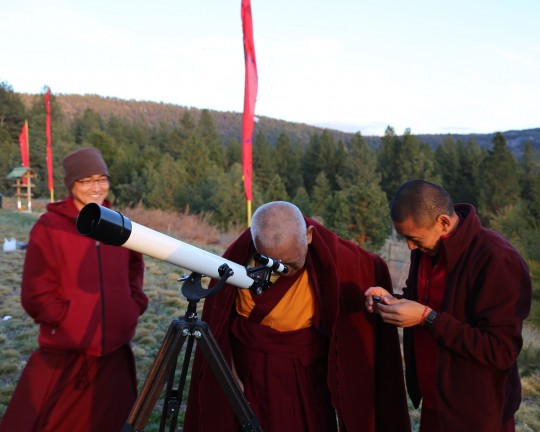
Lama Zopa Rinpoche with Vens. Sherab and Sangpo at Buddha Amitabha Pure Land, Washington, US, April 2014. Photo Ven. Roger Kunsang.
“I would say that compared to others, our lives have been most fortunate,” Lama Zopa Rinpoche instructs in his book Bodhisattva Attitude: How to Dedicate Your Life to Others. ”First of all, many of us have heard the heart of the Buddhadharma, the very essence of the 84,000 teachings of the Buddha, the very precious teaching on the stages of the path to enlightenment (lam-rim) many times. We have even heard this from His Holiness the Dalai Lama himself, who is the real living Chenrezig, the Compassion Buddha manifested in the human form of a monk – the aspect that can most perfectly guide us. Just that alone is most amazing and inexpressible. It is the most unbelievable, rare, fortunate and precious thing that could have happened to us this life.
“Then we have met many other great teachers and unbelievably qualified virtuous friends who preserve the whole entire Buddhadharma – the Lesser Vehicle, Mahayana Paramitayana and Mahayana Tantrayana teachings. Particularly, many of us older students have met and received teachings and initiations from Lama Yeshe, who was kinder than all the numberless past, present and future buddhas and whose holy name is extremely rare and difficult to express.
“So really, if we look at what has happened to us so far in this life, it is most amazing to have met many qualified virtuous friends who can reveal the complete path to enlightenment from their own experience. Can you imagine how most unbelievably fortunate our lives have been?”
You can read more from the chapter “The Teachings: Everything Depends on Your Attitude” from the book Bodhisattva Attitude: How to Dedicate Your Life to Others by Lama Zopa Rinpoche and published by the Lama Yeshe Wisdom Archive.
Learn more about FPMT spiritual director Lama Zopa Rinpoche and his beneficial activities by visiting Rinpoche’s webpage, where you will find links to Rinpoche’s schedule, new advice, recent video, photos and more.
- Tagged: advice, lama zopa rinpoche
- 0
22
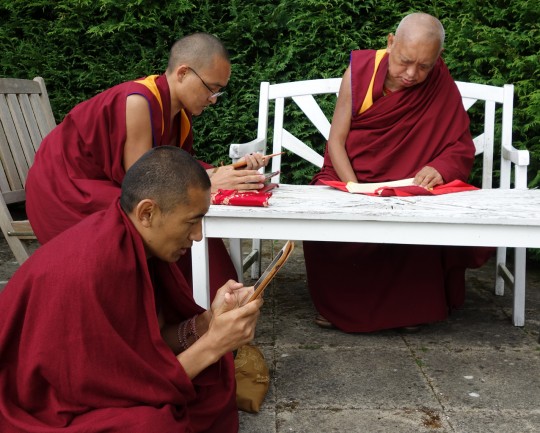
Lama Zopa Rinpoche with Vens. Sangpo and Sherab doing prayers for the future retreat center Land of Joy, UK, July 2014. Photo by Ven. Roger Kunsang.
“A retreat place is not for gaining power like black magic, it’s not for a honeymoon or holiday. Also it is not a place in which to be spaced out,” Lama Zopa Rinpoche advised in 2007.
“The whole purpose of a retreat place is to subdue the mind and to actualize the lam-rim up to enlightenment. It is a place for a holiday from negative karma, a holiday from the three poisonous minds and the self-cherishing thought, a holiday from the self-grasping of the person and phenomena, a holiday from the wrong concepts: non-devotional thought towards the guru up to the subtle dual view of white, increasing, attainment.”
Lama Zopa Rinpoche is the spiritual director of the Foundation for the Preservation of the Mahayana Tradition (FPMT), a Tibetan Buddhist organization dedicated to the transmission of the Mahayana Buddhist tradition and values worldwide through teaching, meditation and community service.
- Tagged: advice, lama zopa rinpoche, retreat
- 0
21
“Guru devotion is the quickest way to collect the most extensive merit, the means to achieve enlightenment,” Lama Zopa Rinpoche once told a group of students at Kopan Monastery. “Of course, the main thing is having the right motivation, bodhicitta, but having a pure mind of guru devotion, with no negative mind arising toward the guru – which is very heavy negative karma – is also very important.
“A negative attitude, such as a thought of giving up respect, even just thinking, ‘What is the use of this teaching?’ creates negative karma; one breaks the samaya vows. A kind of pollution comes, and whatever you offer becomes negative and can invite sickness or obstacles. So, I think, the most important thing is keeping samaya, not doing any wrong thing, not letting heresy arise, having negative thoughts, or losing faith. Lost faith is very heavy. Also, it is important not to break the root pratimoksha vows.
“So much emphasis is placed on guru devotion because, with very strong guru devotion, there is no hardship in following the guru’s advice; it becomes so easy to follow any advice given. …”
You can read more from this teaching on “Guru Devotion” on the page “Advice on Guru Devotion,” part of Lama Yeshe Wisdom Archive’s “Lama Zopa Rinpoche’s Online Advice book.”
Learn more about Lama Zopa Rinpoche, spiritual director of the Foundation for the Preservation of Mahayana Tradition (FPMT), and Rinpoche’s vision for a better world. Sign up to receive news and updates.
- Tagged: advice, guru devotion, lama zopa rinpoche
- 0
20
Retreat Prayer Book Update Now Available
This FPMT Retreat Prayer Book is used in retreats with Lama Zopa Rinpoche, especially the annual Light of the Path retreat in North Carolina, USA. Students are also encouraged to use this collection in their personal retreats as it includes all of the daily practices advised by Lama Zopa Rinpoche for students engaging in retreat.
FPMT Education Services has recently made several updates to the Retreat Prayer Book, on the advice of Lama Zopa Rinpoche.
If you have not yet purchased this prayer book, you may purchase the new, completely updated version of the Retreat Prayer Book PDF from The Foundation Store.
If you have already purchased this prayer book:
- You may keep your old PDF version, but download your complimentary updated pdf of the new version by emailing education@fpmt.org and requesting the promo code, or…
- You may keep your old hard copy version, but use this list and the available downloads of new material to update your old version from the FPMT Prayer Books Updates page.
Thank you for your understanding regarding these updates and we hope adopting the new version creates no obstacles for you.
Through comprehensive study programs, practice materials, training seminars, and scholarships, FPMT Education nourishes the development of compassion, wisdom, kindness, and true happiness in individuals of all ages.
20
“Bodhichitta is thinking to benefit all sentient beings, to free them from suffering and to bring them to full enlightenment, therefore we have to achieve enlightenment, therefore we do this practice, this action, so in this way all the time we are dedicating for other sentient beings. So this child you are taking care of is one of the sentient beings,” Lama Zopa Rinpoche wrote to a student who was concerned about her Dharma practice after having a child. “We always dedicate our practice for the most precious sentient beings, from whom all our happiness comes – all our happiness from beginningless rebirth up to now, even this small happiness, comfort, even if we are feeling hot but then serenely the wind blows on our head and we feel cool, so even including that, or if we are thirsty and we find water to drink.
“All the future happiness, not only samsaric happiness, pleasure, but ultimate happiness, liberation from samsara, full enlightenment, peerless happiness, the state of omniscient mind; so all of that we receive from numberless hell beings, numberless hungry ghosts and numberless animals – that means from numberless fish in the ocean, even the large ones, the whales, then also the smallest ones that we can’t see with our eyes, but only with a microscope; every single ant, every single bird, every single butterfly, every single cockroach – they are numberless in each realm, not just in one universe but there are numberless universes, so each universe has numberless [beings]. We receive all our past, present and future happiness from numberless human beings, numberless suras, numberless asuras and numberless intermediate state beings. All the past, present and future happiness we receive from every single sentient being.
“That includes your child. So all your past, present and future happiness, everything comes from this child. Therefore the child, your baby, is the most precious, most kind, most wish-fulfilling one to you, and as well as that, every single other sentient being – every insect in the house and outside in the forests, on the ground, in the water, and flying in the sky. Therefore, the best Dharma is to cherish the sentient beings and to serve them, to free them from suffering and bring them to happiness. …”
You can read the complete advice ”Taking Care of Your Child with Compassion,” a new addition to “Lama Zopa Rinpoche’s Online Advice Book,” on the Lama Yeshe Wisdom Archive website.
More information, photos and updates about FPMT spiritual director Lama Zopa Rinpoche can be found on Rinpoche’s webpage. If you’d like to receive news of Lama Zopa Rinpoche via email, sign up to Lama Zopa Rinpoche News.
19
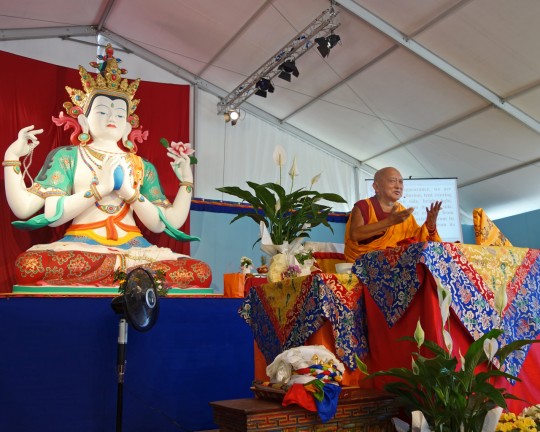
Lama Zopa Rinpoche teaching at Istituto Lama Tzong Khapa, Italy, June 2014. Photo by Ven. Roger Kunsang.
“In reality, even if we believe that we will live for a long time, that we have so many years to live – like 100 years or more, and maybe after 100 years, we expect another hundred years (I’m joking) – in reality, there is nobody who has lived who has not died,” Lama Zopa Rinpoche wrote to the mother of a student, who was worried about death. “Even this big earth has to perish after another great eon. Since every person who is born in this world is under the control of karma and delusion, there is nobody, nobody, since human beings started until now, who has lived without death. There is nobody.
“Buddha has no death, because there is no cause of death. The cause of death is not outside but inside –karma and delusions. Buddha removed this inconceivable eons ago, because he purified the delusions and even the subtle obscurations which interrupt the omniscient mind, so it is impossible for the Buddha to experience death. There is no old age, no sickness, no death for him at all, but he showed holy deeds, passing away in the sorrowless state. If Buddha did not show death, then we would not appreciate his teachings and we would become very lazy. Buddha showed death to destroy the wrong concept of permanence of our lives, which are impermanent, and also to show us that we need to practice Dharma, because of suffering and the cause of suffering. …”
You can read the entire letter “The Cause of Death” on the Lama Yeshe Wisdom Archive website.
Learn more about FPMT spiritual director Lama Zopa Rinpoche and his beneficial activities by visiting Rinpoche’s webpage, where you will find links to Rinpoche’s schedule, new advice, recent video, photos and more.
- Tagged: advice, death, lama zopa rinpoche
- 0
18
In February 1990, Lama Zopa Rinpoche gave a series of teachings as part of the Third Enlightened Experience Celebration, which took place in Bodhgaya, India. His discourse was based on the 15th-century text Opening the Door of Dharma. During the teachings, Lama Zopa Rinpoche described how he came across the text in his late twenties and what it meant to him:
“In 1974, while I was staying in the cave of the previous Lawudo Lama in the Solu Khumbu region of Nepal, I decided to check through all the texts that had belonged to him. They were mostly Nyingma texts relating to the practices of various deities, but there was one text that is a fundamental practice of all four Tibetan sects. The text I found was Opening the Door of Dharma: The Initial Stage of Training the Mind in the Graduated Path to Enlightenment.
“A collection of the advice of many Kadampa geshes, Opening the Door of Dharma is by Lodrö Gyaltsen, a disciple of both Lama Tsongkhapa and Khedrub Rinpoche, one of Lama Tsongkhapa’s two spiritual sons. This text describes the initial stage of thought transformation, or mind training – in other words, the first thing to practice if you want to practice Dharma.
“Only when I read this text did I come to know what the practice of Dharma really means. During all the years of my life up until then I had not known. Practicing Dharma is usually regarded as reading scriptures, studying, memorizing, debating, saying prayers, performing rituals, and so forth. It was only when I read this text that I found out how to practice Dharma. I was very shocked that all my past actions had not been Dharma. When I checked back, all those past years of memorizing and saying prayers were not Dharma. From all those years, nothing was Dharma. …”
Rinpoche’s discourse on Opening the Door of Dharma can be read in the book The Door to Satisfaction, edited by Vens. Ailsa Cameraon and Robina Courtain and published by Wisdom Publications. A PDF of the “Foreward” by Kirti Tsenshab Rinpche, “Editor’s Preface” and “Prologue” is available from Wisdom online. The “Prologue” includes Rinpoche’s account of his education, meeting Lama Yeshe and returning to Lawudo as well as the significance of his discovery of Opening the Door of Dharma.
Lama Zopa Rinpoche is the spiritual director of the Foundation for the Preservation of Mahayana Tradition (FPMT), a Tibetan Buddhist organization dedicated to the transmission of the Mahayana Buddhist tradition and values worldwide through teaching, meditation and community service.
18
Lama Zopa Rinpoche Mantra Recitations Volume 1
In this new collection of studio recordings, Lama Zopa Rinpoche chants several deities’ mantras at different speeds, allowing students to become familiar with Rinpoche’s pronunciation and also Rinpoche’s preferred tunes. This collection of MP3 recordings include:
- Green Tara mantra
- Maitreya mantras
- Chenrezig’s Mani mantra fast and slow
- Manjushri mantra with and without the mala recitation of DHI’s at the end
- Medicine Buddha long and short mantras
- Shakyamuni Buddha mantra fast and slow
This collection is available for purchase from the Foundation Store.
Through comprehensive study programs, practice materials, training seminars, and scholarships, FPMT Education nourishes the development of compassion, wisdom, kindness, and true happiness in individuals of all ages.
14
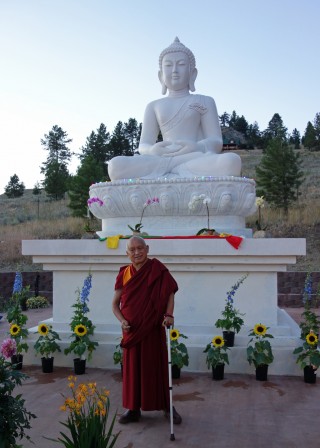
Lama Zopa Rinpoche with the new Amitabha Buddha statue at Buddha Amitabha Pure Land, Washington, US, July 2014. Photo by Ven. Roger Kunsang.
“It is not good to leave statues or stupas completely empty. To leave a statue empty is like offering nothing to the buddhas and can create obstacles,” Lama Zopa Rinpoche instructs in “Essential Mantras for Holy Objects.”
“Therefore, it is important to put something inside of the statue, even as little as a few mantras and some incense. This is also true when offering statues to your teachers, there should always be something placed inside of them for auspiciousness. If you need to wait a while until your statue/stupa can be properly filled and consecrated, then roll up a copy of the Four Dharmakaya Relic mantras, or the five powerful mantras and place them inside the statue with some incense for the time being. …”
You can read more in FPMT Education Services’ “Essential Mantras for Holy Objects.” Also visit Education Services’ page on “Holy Objects” for more advice and resources.
More information, photos and updates about FPMT spiritual director Lama Zopa Rinpoche can be found on Rinpoche’s homepage. If you’d like to receive news of Lama Zopa Rinpoche via email, sign up to Lama Zopa Rinpoche News.
- Home
- News/Media
- Study & Practice
- About FPMT Education Services
- Latest News
- Programs
- New to Buddhism?
- Buddhist Mind Science: Activating Your Potential
- Heart Advice for Death and Dying
- Discovering Buddhism
- Living in the Path
- Exploring Buddhism
- FPMT Basic Program
- FPMT Masters Program
- FPMT In-Depth Meditation Training
- Maitripa College
- Lotsawa Rinchen Zangpo Translator Program
- Universal Education for Compassion & Wisdom
- Online Learning Center
- Prayers & Practice Materials
- Overview of Prayers & Practices
- Full Catalogue of Prayers & Practice Materials
- Explore Popular Topics
- Benefiting Animals
- Chenrezig Resources
- Death & Dying Resources
- Lama Chopa (Guru Puja)
- Lama Zopa Rinpoche: Compendium of Precious Instructions
- Lama Zopa Rinpoche: Life Practice Advice
- Lama Zopa Rinpoche Practice Series
- Lamrim Resources
- Mantras
- Prayer Book Updates
- Purification Practices
- Sutras
- Thought Transformation (Lojong)
- Audio Materials
- Dharma Dates – Tibetan Calendar
- Translation Services
- Publishing Services
- Teachings and Advice
- Find Teachings and Advice
- Lama Zopa Rinpoche Advice Page
- Lama Zopa Rinpoche: Compendium of Precious Instructions
- Lama Zopa Rinpoche Video Teachings
- ༧སྐྱབས་རྗེ་བཟོད་པ་རིན་པོ་ཆེ་མཆོག་ནས་སྩལ་བའི་བཀའ་སློབ་བརྙན་འཕྲིན།
- Podcasts
- Lama Yeshe Wisdom Archive
- Buddhism FAQ
- Dharma for Young People
- Resources on Holy Objects
- Ways to Offer Support
- Centers
- Affiliates Area
- Teachers
- Projects
- Charitable Projects
- Make a Donation
- Applying for Grants
- News about Projects
- Other Projects within FPMT
- Support International Office
- Projects Photo Galleries
- Give Where Most Needed
- FPMT
- Shop
Subscribe to FPMT News
Translate*
*powered by Google TranslateTranslation of pages on fpmt.org is performed by Google Translate, a third party service which FPMT has no control over. The service provides automated computer translations that are only an approximation of the websites' original content. The translations should not be considered exact and only used as a rough guide.FPMT is unbelievably fortunate that we have many qualified teachers who are not only scholars but are living in practice. If you look, then you can understand how fortunate we are having the opportunity to study. With our Dharma knowledge and practice we can give the light of Dharma to others, in their heart. I think that’s the best service to sentient beings, the best service to the world.










